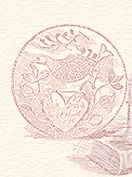Ihr liewe Leit:
In Yaahrbicher 7, 8 un 9 vun der PD Gesellschaft ass sie in 1897,
1898, un 1899 rausgewwe hot, do kann mer kee Watt in PD lese. Awwer in 1900,
im Yaahrbuch 10, finnt mer en Dutzent Gedichde vum J. Max Hark, D.D.
(1849-1930), en Grinder vun der Gesellschaft (1891).
In seim Addickel "En Hondvoll Farsh" hot er beweise wolle ass mer
graad so gut in PD dichde kennt ass wie in Englisch odder Hochdeitsch odder
eenich annere Schprooch. Awwer es scheint ass er graad "begraawe" bleibt im
Yaahrbuch 10. Kennt's sei ass er sei Deitsch enwennich "gschpassich"
buchschtaawiert hot? Do iss der aerscht Vaersch vun seim Gedicht "Der alde
Karch-hof uf'm Barg":
Ich vays ken Blotz in der ganse veldt so shay,
So rooich un shdill,
Un voo ich so g'sadisfyd feel
As alles nix ausmachd, kay Druvvel, kay Vay,--
As der alde Kach-hof uf'm Barg.
Nau, kennt es sei ass die Kriddiker sei Gedichde gaar net gelese
hen weil sei Schpelling so "annerscht" waar? Kennt es sei ass sie yuscht sei
Tiddel gelese hen un deswege gesaat hen ass sei Gedichde yuscht "gewehnlich"
waere? Lest mol sei "En Leicht" graad wie der John Birmelin es buchschtaawiere
deet:
Dick fallt der Schnee;
Aus der dunkle Heeh
Bloosst der Schtarmwind middem mechdiche Ghaus;
Un dief in mem Hatz
Iss en biddrer Schmatz-
Sie begraawe en Meedel uff em Karchhof draus.
Fallschtarriger, O Schnee!
Deck zu all die Weh
Vun ihr un vun mir
Deck zu all die Weh
Vun ihr un vun mir mit deim weisse Gewind!
Blooss hadder, du Schtarm!
Mach dei argschder Larm!
Verdreib in die Ewichkeit ihr un mei Sind!
Nau saag, we will mir saage ass sell "gewehnlich" iss? Fer 1900 iss
sell awwer recht ungewehnlich, deet ihr net denke?
Un do iss der aerscht Vaersch vum Hark sei Gedicht "Der Schpode
Schulbu":
Em Tschaerli sei Mudder schteht an der Fens vorm Haus
Un ruft alsfatt ihr Bu:
"Wu bleibt dann der Tschaerli? Die Schul iss lengscht aus;
Bei daer Zeit is ser schunnscht immer do,"
Hie un zrick geht sie, un rei un raus,
Un-weess net was zu duh.
Mer misse neegscht Woch weidermache mit dem do "gewehnlich" Gedicht.
Macht's gut,
Der Alt Professer
|
Dear people:
In yearbooks 7, 8 and 9 of the PG Society that it published in
1897, 1898 and 1899, you can find no word of PG. But in 1900, in yearbook
10, you find a dozen poems by J. Max Hark, D.D. (1849-1930), a founder of
the Society (1891).
In his article, "A Handful of Verse" he wanted to show that you
could write poems in PG just as good as in English of Standard German or
any other language. But it seems that he has just remained "buried" in
yearbook 10. Could it be that he spelled his PG a little "funny'? Here is
the first verse of his poem "The Old Churchyard on the Hill":
Ai noe no playse inn the hole werld so naise
So kwyet and stil
Aend whare Ai fele so saddisfaid
Thaet nothing maykes a diffens, no trubbel, no payne-
Thaen the olld tschertschyard on the hil.
Now, could it be that his critics didn't at all read his poems
because his spelling was so "different"? Could it be that they just read
his titles and therefore said that his poems were just "ordinary"? Just
read once his "A Funeral" exactly as John Birmelin would have spelled it:
Thickly falls the snow;
From the dark heights
Blows the stormwind with a mighty raging;
And deep in my heart
Is a bitter pain-
They are burying a girl out in the churchyard.
Fall stronger, oh snow!
Cover all the pain
Of me and of her with your white mantel!
Blow harder, you storm!
Make your worst noise!
Drive off into eternity her and my sin!
Now, say, who wants to tell me that that is
"ordinary/commonplace/the usual"? For 1900 that is right unusual/
uncommon, wouldn't you think?
And here is the first verse of Hark's poem "The Late Schoolboy":
Charley's mother stands at the fence before the house
And continuously calls her boy/son:
"Where is Charley? School has been out a long time already;
By this time he is usually always here."
Back and forth she goes, in and out,
And doesn't know what to do.
We will have to continue next week with this "usual/commonplace"
poem.
Take care,
The Old Professor
|













